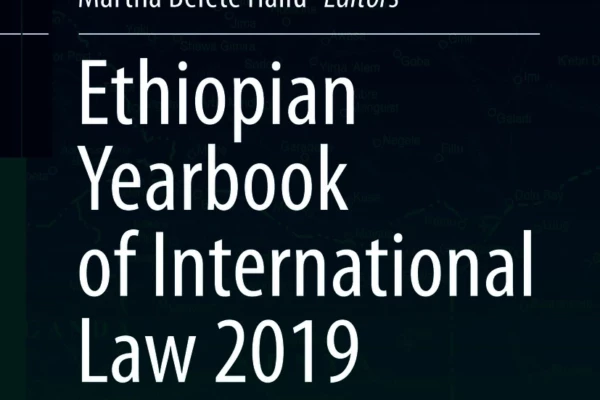
Africa and the regulation of transnational arms brokering: challenges to implement international standards
December 1, 2020Brian Wood and Peter Danssaert contributed a chapter on transnational arms brokering for the Ethiopian Yearbook of International Law 2019, edited by Zeray Yihdego, Melaku Geboye Desta, Martha Belete Hailu (2020). Abstract: African countries face an ongoing threat from the consequences of unregulated arms brokering but this cannot be solved by remedial action in Africa alone. Cases show t
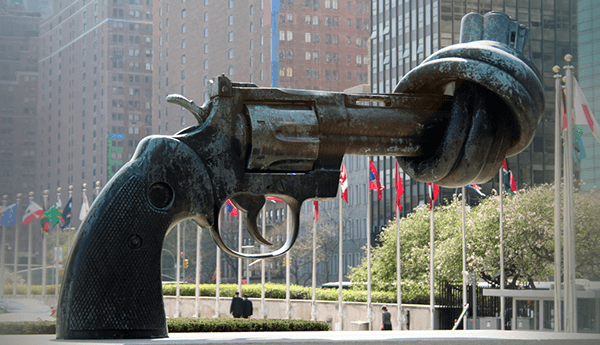
E-learning: The Arms Trade Treaty
August 27, 2020In June 2017, IPIS launched its e-learning digital education package to support the early ratification and effective implementation of the Arms Trade Treaty.The Arms Trade Treaty (ATT) was adopted by the UNGA on 2 April 2013 and entered into force on 24 December 2014. There are currently 92 States Parties and 130 Signatories. Implementation of the Treaty is the responsibility of States Parties, w
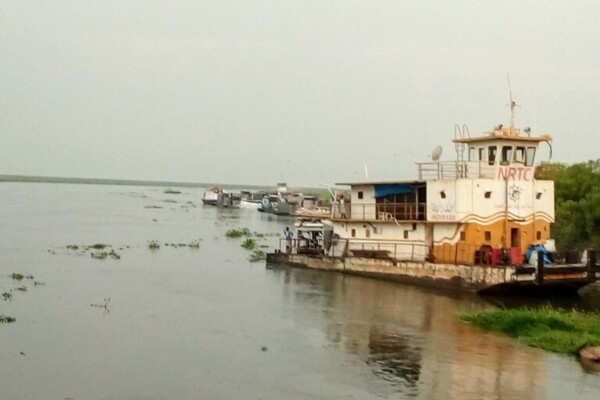
Annual Report 2019
August 26, 2020This 2019 annual report provides an overview of IPIS’ research projects, capacity enhancement and outreach activities throughout last year. Read the full activity report to see what IPIS has been up to in 2019.

Arms Trade & Security
July 28, 2020IPIS researches problematic transfers of arms and their logistics to contribute to prevention of irresponsible arms transfers that exacerbate violence, conflict and repressionFor over two decades, IPIS has developed solid expertise on arms trade and related issues. IPIS researchers have published detailed reports separately and in association with other partners, including as consultancy work for
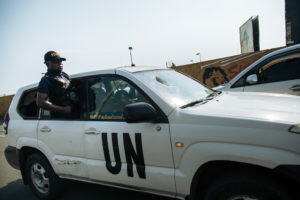
Africa and the ‘grey market’
February 8, 2020Arms brokering or inter-mediation is a commercial activity within the international arms trade that is difficult to regulate. Arms brokers often operate transnationally, so often escaping or avoiding national trade controls in their home countries and the countries where transactions have taken place. Their transnational operations also create “grey” markets, which sometimes fuel illicit markets.
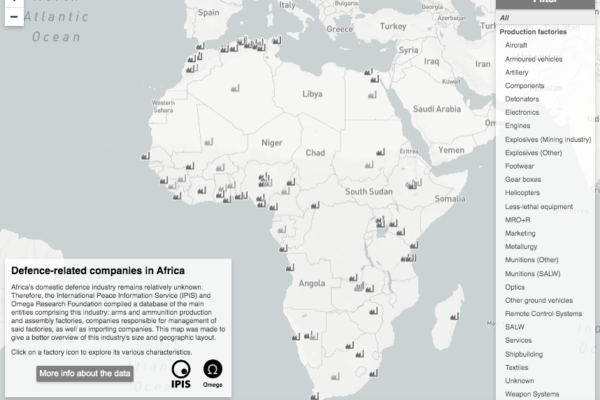
Defence-related companies in Africa
January 3, 2020Africa’s domestic defence industry remains relatively unknown. Therefore, IPIS and the Omega Research Foundation have compiled a database of the main entities comprising this industry, including companies that manufacture, assemble or maintain: arms and ammunition; aeronautical components; vehicles; as well as importing and management companies. This data has been mapped to give an overview of the
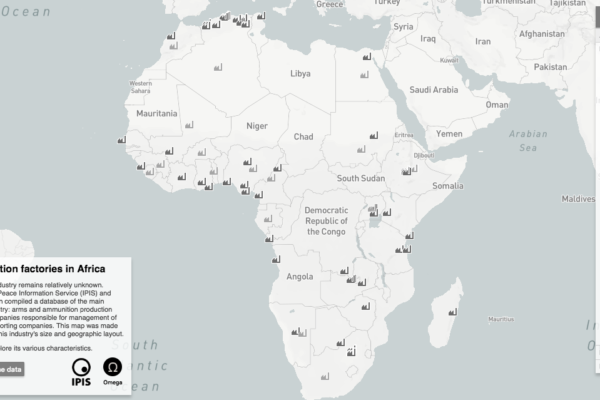
Defence-related companies in Africa
January 1, 2020Africa’s domestic defence industry remains relatively unknown. Therefore, the International Peace Information Service (IPIS) and Omega Research Foundation have compiled a database of the main entities comprising this industry, including companies that manufacture, assemble or maintain: arms and ammunition; aeronautical components; vehicles; as well as importing and management companies. This data
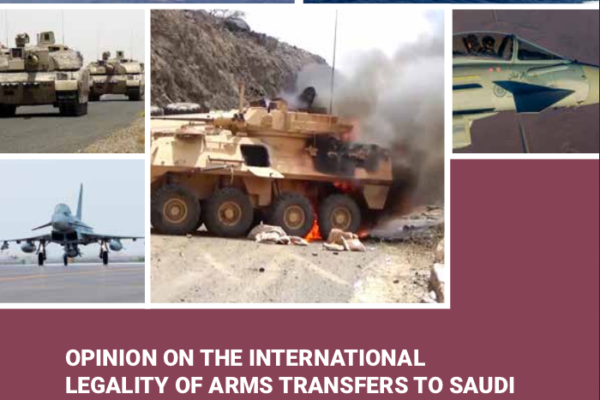
Opinion on the Legality of Arms Transfers to Saudi Arabia, The United Arab Emirates and other members of the coalition militarily involved in Yemen
December 10, 2019This opinion addresses the legality under international law of the transfer of conventional arms and related equipment to the parties currently engaged in the conflict in Yemen. The opinion does not assess the legality of the export, import or sale of arms to those parties in the light of the domestic law of each supplying State, nor does it consider in detail the obligations of non-state armed gr
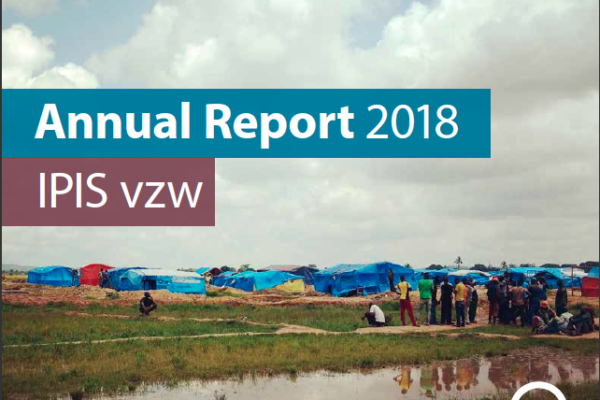
Annual Report 2018
June 27, 2019This 2018 annual report provides an overview of IPIS’ research projects, capacity enhancement and outreach activities throughout last year. IPIS consolidated its work in DRC, Central African Republic and Tanzania and deepened its expertise on mapping, data analysis and research on conflict drivers, natural resources, Business & Human Rights and arms trade. IPIS worked closely with civil societ

Anti-Diversion Measures. Real-Time Locating Systems
May 20, 2019Diversion is largely a self-inflicted problem that stems from negligence by states, militaries, and civilians (Small Arms Survey, 2008). The illicit trade of small arms and light weapons remains a serious problem internationally and in many countries. To prevent the illicit trade States call for responsible arms export control systems to be put in place. One solution is to prevent diversion, mostl

Infographic – The ATT, arms trade to Saudi-Arabia and violence in Yemen
February 8, 2019The ongoing war in Yemen has transformed into a humanitarian catastrophe of unknown magnitude. Civilian casualties, estimated in the millions, continue to rise as do the number facing severe famine. Saudi Arabia and other parties to the Yemeni conflict stand accused of repeatedly violating international humanitarian law. In spite of these allegations, countries continue to export weapons and milit
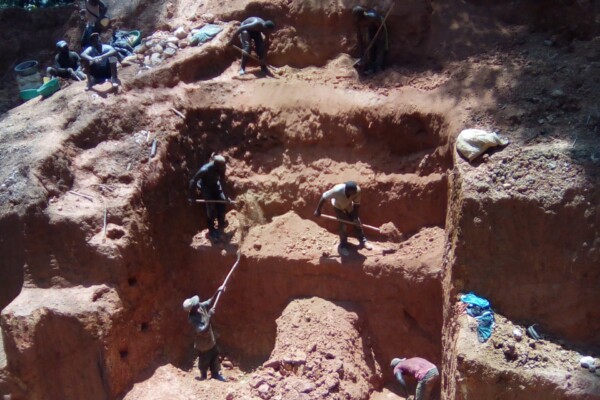
Annual Report 2017
August 21, 2018In its 2017 annual report, IPIS gives an overview of its research projects and activities. It covers the four research programmes that IPIS focusses on: natural resources, arms trade, conflict mapping and business and human rights. IPIS explains among others its mapping work of artisanal mining sites in the Democratic Republic of Congo, its work on Human Rights in mining in Northwest Tanzania an

IPIS launches e-learning for a thorough understanding of the global Arms Trade Treaty
September 12, 2017As governments gather in Geneva to discuss how to regulate the global arms trade by implementing the Arms Trade Treaty, the Belgian Research Group IPIS is launching a set of self-learning digital modules to promote understanding of the Treaty. The e-learning modules are designed to support the early ratification and effective implementation of the Treaty. The modules can be accessed in English, Fr

E-learning: The Arms Trade Treaty
September 7, 2017In June 2017, IPIS launched its e-learning digital education package to support the early ratification and effective implementation of the Arms Trade Treaty. The Arms Trade Treaty (ATT) was adopted by the UNGA on 2 April 2013 and entered into force on 24 December 2014. There are currently 92 States Parties and 130 Signatories. Implementation of the Treaty is the responsibility of States Parties,

E-learning modules for the implementation of the Arms Trade Treaty
August 31, 2017In June 2017, IPIS launched its e-learning digital education package to support the early ratification and effective implementation of the Arms Trade Treaty. The objective of this e-learning course is to enhance knowledge of arms transfer control issues amongst key stakeholders. The course contains 13 modules covering the key provisions of the Arms Trade Treaty. Dates: 2017 Location(s): Belgium Re
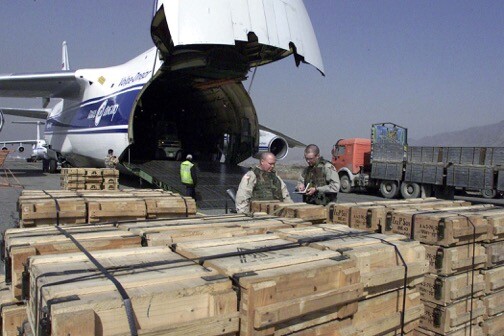
Surplus and Illegal Small Arms, Light Weapons and their Ammunition: the consequences of failing to dispose and safely destroy them
August 11, 2017This joint report by IANSA and IPIS documents recent failures in some countries across world regions to properly dispose of and destroy excess small arms and light weapons (SALW), and their ammunition. It illustrates the different ways that excessive, poorly secured, weapons, especially firearms and ammunition, leak out into the hands of abusers and to those unauthorised to trade and use them, and
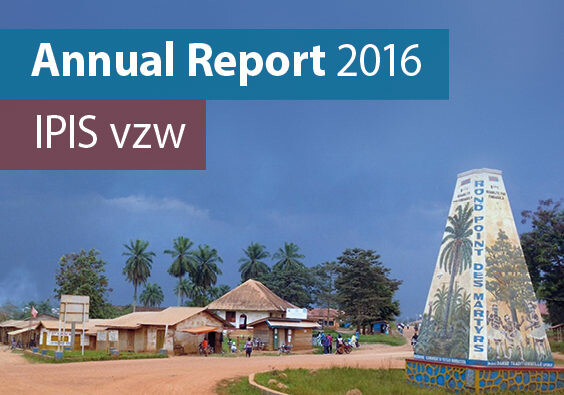
Annual report 2016
June 23, 2017In its 2016 annual report, IPIS gives an overview of its research projects and activities. It covers the four research programmes that IPIS focusses on: natural resources, arms trade, conflict mapping and business and human rights. In 2016, IPIS continued to be a rally point for hard to get data on natural resources, often visualised in maps. Our flagship map for 2016 is the interactive map of art
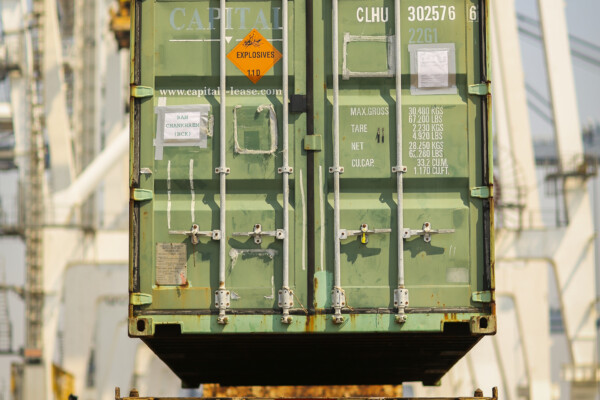
Optimalisatie van het wapenhandeldecreet en wapenhandelbesluit: advies van IPIS en Amnesty International Vlaanderen
June 22, 2017In maart 2012 publiceerden Amnesty International Vlaanderen en IPIS een nota met analyse en aanbevelingen bij het ontwerp van decreet “betreffende de in-, uit-, doorvoer en overbrenging van defensiegerelateerde producten, ander voor militair gebruik dienstig materiaal, ordehandhavingsmateriaal, civiele vuurwapens, onderdelen en munitie”. Het uiteindelijke ‘Wapenhandeldecreet’ van 30 juni 2012 schi
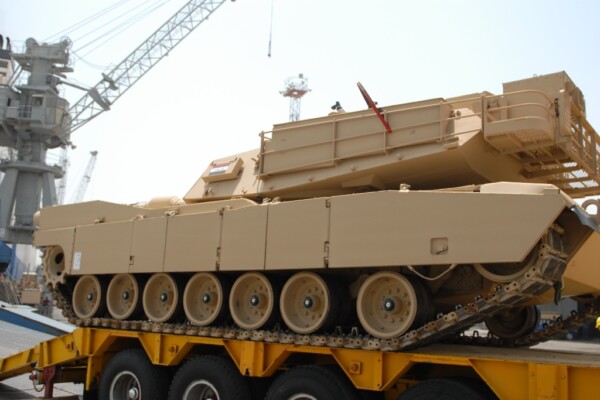
Fatal Freight: Ships, Guns and Human Rights Abuses
June 12, 2017TransArms and IPIS undertook a thorough research of the responsibilities of states and companies involved in the transfer of military equipment by sea under customary international law. The maritime transport is by far the main modality for the transfers of military equipment and commodities. The report considers cases of irresponsible shipments of arms and military commodities to countries with
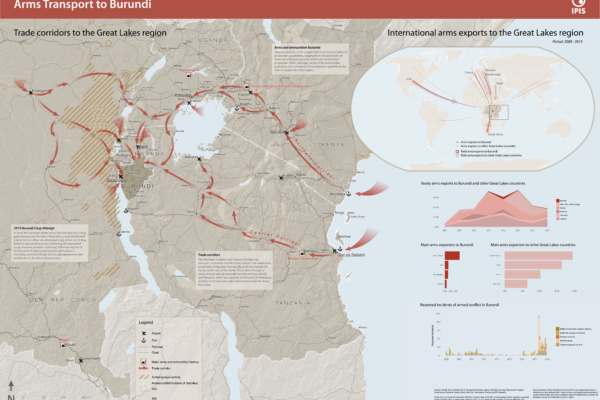
Arms Trade Corridors to Burundi
May 5, 2017Burundi has seen a period of unrest following the failed coup d’état by a Burundian general in May 2015. In order to better understand the situation, IPIS drafted a new map entitled ‘Arms transport to Burundi’, which puts the 2015 unrest in the geographical perspective of the Great Lakes region and in the relevant timeframe covering 2008 to 2015. The map highlights two important factors in the rec

